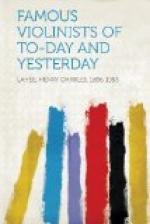At the close of the first piece, the ‘Adagio
Maestoso,’ there was one universal shout
of applause, which afforded an infinite relief to a
most enthusiastic house that had held its breath
for fifteen minutes. Ole Bull came before
the curtain and bowed, with his hand upon his heart.
There is something different in his performance from
that of any other artist, and yet it is difficult
to describe the peculiarity of his style, except
that he touches all the strings at once, and
plays a distinct accompaniment with the fingers of
his right hand. But the charm is in the
genius of the man and the grandeur of his compositions.
He knows how to play upon the silver cord of
the heart which binds us to a world of beauty, and
vibrates only when touched by a master hand.”
The sentiments and emotions aroused in the breast of this critic appear to have been those with which Paganini inspired his audience, when he played a duet on two strings, as related in an earlier chapter. Ole Bull was a child of nature, he gave his audience a description of the beauties of nature, and behold! it is interpreted as a story of human passions,—a high tribute to descriptive music.
The following criticism seems more in keeping with the ideas known to have been held by the violinist, and almost leads one to imagine that the critic was fortunate enough to obtain an interview with the virtuoso before writing his account:
“FEBRUARY, 1844.
“To what shall we compare Ole Bull’s playing? Was it like some well-informed individual who has seen the world and who spices his tales of men and things with song and story—now describing the beauties of Swiss scenery, now repeating the air which he caught up one moonlight night on the Bosphorus, and anon relating a stirring joke which he gleaned on the Boulevard. Such a man would create an impression on any small tea-party, but that violin did more—the comparison fails. There might be to him who chose to give rein to his fancy a vision at one moment of the old ivy-covered church and the quiet graveyard, the evening sun streaming through the rich stained glass, the organ faintly heard through the long aisles and the deep chancel, and around and about the singing of some bird of late hours, and the hum of the bee as he flew by, well laden, to his storehouse of sweets.
“Then the clouds flew fearfully, and the wind moaned through the boughs of the old oak-tree in its winter dishabille, and so down to the seashore, when it rushed over cliffs and crags and knocked off the caps of the mad waves and sped on like a tyrant, crashing everything in its way and rejoicing in its might. And so we glided oddly but easily enough into the ballroom, where mirth and laughter, bright eyes, fairy feet, and all that was good and pleasant to behold flitted by. It was not all music that Ole Bull’s violin gave out. There were old memories and pleasant ones, ideas which shaped themselves




